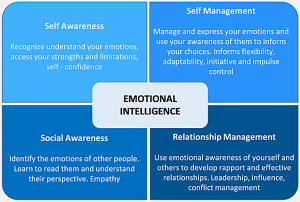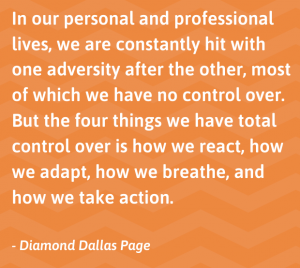
26 Aug Continuous Growth: Increase Your IQ, EQ, and AQ With These Simple Tips
“There are no great limits to growth because there are no limits of human intelligence, imagination, and wonder.” – Ronald Reagan
Growth is a continuous process that we experience throughout our lives; sometimes we seek out opportunities for development, and other times life provides us with circumstances that force us to grow. Regardless, growth in a positive direction is critical for us to advance our lives, especially in our careers and relationships with others.
In this article we’ll examine three common measures that are able to predict success in business environments as well as in your everyday life, then follow up with ways you can increase your scores in each.
Intelligence Quotient (IQ)
This is probably the area everyone is most familiar with – IQ, or intelligence quotient. The term “IQ” was first developed in 1912 by German psychologist William Stern; it was used to describe a scoring method for intelligence tests that gave the test-taker a ratio of their estimated mental age compared to their actual chronological age.
 IQ tests have changed significantly over the years, with newer versions still being frequently used to determine educational placement, as assessments of intellectual disability, and as an evaluation tool for job applicants. To learn more about how these tests are used to evaluate job candidates, specifically remote workers, check out our article on the topic here.
IQ tests have changed significantly over the years, with newer versions still being frequently used to determine educational placement, as assessments of intellectual disability, and as an evaluation tool for job applicants. To learn more about how these tests are used to evaluate job candidates, specifically remote workers, check out our article on the topic here.
As you can see from the graph to the right, an IQ score of 100 categorizes you as having average intelligence. A score below 70 indicates the presence of a developmental or learning disability, while a score greater than 130 indicates giftedness. (img source)
In research studies, IQ scores have even been found to be predictors of job performance, income, health, and longevity of life. However, the term can be a bit confusing when you consider what it actually measures – by measuring various areas of one’s intelligence like short-term memory, analytical thinking, mathematical ability, and spatial recognition, it’s defines one’s capacity to learn, rather than the amount of information one has already learned.
We could all use help making more money, getting healthier, and performing better at our jobs, so we’ll get to the good stuff –
how can you increase your IQ?
Here are a few simple activities you can do to increase your intelligence quotient:
study a new language – Learning a new language causes the language centers in your brain to expand, which can also make you a more effective negotiator, reader, and problem-solver. (source)
get enough sleep – Disturbances to healthy sleep patterns can cause your IQ to drop by a significant five to eight points. Even more surprisingly, missing out on a single night of sleep can reduce your IQ by one standard deviation, which can leave you operating as if you’ve got a learning disability the next day. (source)
start sprinting – A Swedish study proved that cardiovascular fitness can actually raise your verbal intelligence by 50%, so lace up your Nikes if you want to become a more concise and articulate speaker and writer.
If you want to find out your IQ score, take the test here.
Emotional Quotient (EQ)
Perhaps less recognizable than IQ but still well known in certain circles, EQ represents one’s emotional quotient. The term was coined by Peter Salovey and John D. Mayer in 1990, describing EQ as “a form of social intelligence that involves the ability to monitor one’s own and others’ feelings and emotions, and the ability to use this information to guide one’s thinking and action.” (source)
A psychologist and writer named Daniel Goleman became aware of Salovey and Mayer’s work soon after it was published, and expanded upon their definition.
He argued that it was not cognitive intelligence that guaranteed business success, but rather emotional intelligence, describing emotionally intelligent people as having four specific characteristics.
 Self-awareness – one’s ability to understand their own emotions
Self-awareness – one’s ability to understand their own emotions
Self-management – one’s ability to manage their own emotions
Social awareness– empathetic to the emotional drives of others
Relationship management – one’s ability to handle other people’s emotions
For a more detailed understanding of each area, take a look at the chart to the right. (source)
How can you increase your EQ?
put yourself in others’ shoes – take time to explore why someone might feel a certain way about a given situation, while also considering what people deal with behind closed doors. We don’t always see eye-to-eye with others, and generally, people have good reasons for seeing the world the way they do. Keeping this in mind can help you cooperate with others when problems arise.
pause before acting or speaking – how often have you found yourself saying something you shouldn’t have said as an automatic response? Many social situations require tact and sensitivity, and taking a brief pause to really think about what you want to say or do can make a huge difference in how others perceive you.
when receiving criticism, consider what you can learn – if you’re given genuinely constructive criticism, try not to rush to your own defense before hearing what someone has to say. If you put your feelings aside, what can you learn from this person’s perspective?
If you want more information on the topic of emotional intelligence and group cohesion, check out our blog post titled “What Makes Certain Groups More Successful Than Others?”
If you want to find out your EQ score, take the test here.
Adversity Quotient (AQ)
AQ, or adversity quotient, can be defined as a measure of one’s resilience and adaptability. The term was coined by author Paul Stoltz in 1997 in his book Adversity Quotient: Turning Obstacles Into Opportunities. Though it was defined over 20 years ago, it’s just now beginning to gain traction in business circles, and many prominent figures believe it’s more critical than IQ or EQ when it comes to professional success.
 Also known as grit, it’s primarily used to predict attitude, reactions to mental stress, perseverance, longevity, learning, and response to changes in one’s environment. (source)
Also known as grit, it’s primarily used to predict attitude, reactions to mental stress, perseverance, longevity, learning, and response to changes in one’s environment. (source)
People with a higher AQ respond to challenging situations more effectively, can better reserve their energy during periods of intense stress, and generally perform better, are more healthy, and have more positive outlooks than those with a lower AQ. To put it simply, those who are willing to continue chugging through tough circumstances when others quit are better at facing adversity.
How can you increase your AQ?
Authors Roger Connors, Craig Hickman, and Tom Smith, developed a model known as the Steps to Accountability which describes a method people can use to learn how to effectively react and adapt to change. The model is four simple steps:
See it – Acknowledge change is needed, whether it’s in the personal or professional areas of your life. Evaluate what’s causing your need for change, prepare yourself to make the change, and handle it in an open manner. Be sure to ask others for their perspectives on your situation; though it’s not always easy, asking for feedback and constructive criticism during this stage is crucial.
Own it – Take ownership of the situation. Accept that you’ll be challenged and will likely fail at some points during your change, but refuse to lose sight of your end goal.
Solve it – Come up with a game plan. List out the steps you’ll need to take to ensure that the change is successful, while continuing to ask yourself “What else can I do?” How can you think differently about the situation to come up with new solutions?
Do it – Execute the change. This step ties all of the previous steps together – when you’re executing the change, continue to acknowledge it’s needed, remain accountable for whatever happens, and always seek to find new solutions to the issue you’re solving. (source)
In addition, there’s no better way to increase your AQ than to put yourself into situations that make you uncomfortable but provide opportunities for growth. When you experience a setback, continue to push through until you achieve what you set out to do. Make a list of everything that scares you, and face those situations head on. You may find that you end up living a much more fulfilling and satisfying life, both personally and professionally.
If you want to find out your AQ, take the test here.
Do you have any additional tips for increasing your IQ, EQ, or AQ? Leave a comment on our LinkedIn or Facebook pages letting us know what you think!
——————————————————————————————————————————————————————————————————–
If you’re in search of recruiting services or could use help determining your business needs, contact our team of experienced talent acquisition consultants now.


